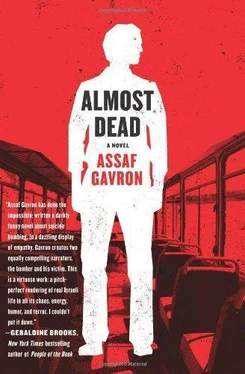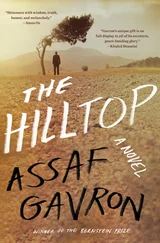After a particularly pointless conversation on Left and Right one day, I received a phone call from Benzi Dikstein, spokesperson for the Communities Committee. I asked what the Communities Committee was. He said, ‘Exactly! That’s exactly our problem: no one’s heard of us. We’re a group of lobbyists who represent a few communities in Greater Israel opposed to the dismantling of settlements and the transfer of Jews.’
‘Ah, settlers.’
‘We prefer “inhabitants”,’ said Benzi. ‘Eitan, as someone well known, someone who’s experienced a lot and knows the reality intimately, we think you would be a tremendous asset to our cause.’ I burst out laughing. ‘Me?’ ‘But you were speaking against non-voluntary transfer on IDF Radio only a couple of minutes ago. By the way, do you know where the name Enoch comes from?’ ‘Uh…no. I keep meaning to go to the Diaspora Museum and check it out.’ ‘Well, it’s a corruption of Chanoch, the father of Methuselah, and they never managed to kill him either. Or not for a long time, anyway…’ He gave a couple of barks that must have been some kind of laughter.
One day Shmulik Kraus called. ‘Oh my God,’ I yelled to Duchi, ‘Shmulik Kraus!’ Duchi came running and then stopped. ‘It won’t be him,’ she said, ‘it’ll be that lefty.’ I put my ear back to the phone. ‘…not Shmulik Kraus the singer, of course, I’m Shmulik Kraus from Stop the Occupation.’ ‘Oh,’ I said.
‘We really liked the things you said this morning,’ he continued, slipping from single into plural, ‘against this ridiculous curfew that our genius defence minister gave the residents of the West Bank for a holiday present, not the Jewish ones, of course’ (I couldn’t remember what I’d said, but I may possibly have called Mofaz a clown), ‘and we wanted to ask whether you would like to be one of the speakers in our demonstration this Saturday night in Rabin Square?’
I kept having conversations like this. Calls from the right, the left, the non-aligned, the Society against Violence in the Family, and one time — after I accidentally stepped in some dog shit on Ibn-Givriol Street while talking on my mobile to the radio and had broken off to curse dog-owners who didn’t clean up their dogs’ mess — from the Society for a Clean Tel Aviv, who turned out to be pro transfer of dogs.
‘Sue the National Insurance,’ I was told, ‘and you’ll get one hell of a pension.’ A lawyer volunteered himself on a no-win, no-fee basis. A special committee of the Defence Ministry — three legal experts who debate lawsuits from alleged victims of terrorist attacks — approve or deny your compensation. My lawyer told me that my fame would guarantee compensation because I was a media darling and they wouldn’t dare not pay. I went to meetings, discussed tactics, cut out articles from newspapers. They threw my claim out. My lawyer, head in his hands, said it was unbelievable how heartless they could be. ‘This country’s falling to bits!’ he said, and blamed my fame. Then he asked for a $2,000 fee. Duchi called me an idiot, having warned me early on not to get into it. Someone else had suggested that the Hostile Actions Casualties Organisation would be more sympathetic. So I tried. They weren’t.
And what else? The General Security Services came to say hi, though it took me about half an hour to figure out what they wanted. I’d been in three consecutive attacks and got away without a scratch. Wasn’t that a little suspicious? Did I have, or had I ever had, Arab friends? Friends from the territories? Did I feel empathy for the suffering of the Palestinian people? Did I support their struggle? I told them that they were a national disgrace and that they should pick on the perpetrators not the victims and then burst out crying. Eventually they got off my back. Or I think so, anyway.
A private association helping victims of terror called One Family asked me to come and speak to other victims once a week. They thought that after Noah’s Ark and all the articles and the radio I might lift a few spirits. So I went a couple of times but quite a few of the audience blamed me for shamelessly exploiting terrorist attacks which had killed and injured others. I’d escaped without a scratch and was now trying to cash in and promote myself. I showed them the bump on my forehead and said I wasn’t making any money: ‘I wish I was!’ I told the hecklers that I hadn’t asked anyone to write about me. It didn’t matter: I was arguing with people who’d been injured or lost their family and friends. They were looking for a target for their anger and I would do. So I removed the target from their sights, though I was criticised for that too. I was told that I’d only stopped going because the media weren’t there and I was only interested in the media. One of the things I learned during those months is that sometimes you can’t win. And you can’t even say that you can’t win, because then they say that you’ve a nerve to complain while others have lost limbs or are traumatised for life, so I ought to just shut up.
I tried to shut up.
But there I was on the cover of People : ‘Eitan Enoch — The Escape Artist’. Maariv published a profile of me. You could see me in another newspaper answering a questionnaire about things like my favourite colour and my favourite song of the year (grey; ‘Nine’ by the Nomad Saddlers). In The City I read that I had been ‘Spotted: the man who said “No, thanks!” to terror, Croc Attack, on his own in hip boho eatery Bar BaraBush, ordering a hamburger called “The Cannibal Is Hungry Tonight”.’
Of all my new friends, the real and the fake, the temporary and the permanent, the two I liked the most were policemen. Inspector Avi ‘Almaz’ Yahalom headed the investigation into the attack on the Little No. 5; Zion Ferrer investigated the Café Europa attack. Almaz’s team consisted of himself and a policewoman called Ricky. Zion’s team consisted of Zion. It’s not that they don’t investigate terror attacks, but as soon as it becomes clear that the motive was political most of the work reverts to the General Security Services. The police work on the criminal aspects of the attack: stolen vehicles, thefts that might tie in, life or property insurance swindles, victim identifications, and occasionally they turn up things the GSS can use.
Almaz and Zion Ferrer contacted me as they did every eyewitness (the inspector who investigated Shaar Hagai contacted me too but I’m not going to waste precious seconds of our lives on him because he’s a stupid arrogant fatso who thought it a good idea to put the GSS on to me) and I made an appointment to see Zion in Jerusalem on one of my Wednesdays. It was one of the first warm days after the winter, with the sun very clear and unsoftened by the haze you get in the Tel Aviv sky. Ferrer had sunglasses on a cord around his neck and two sweat-circles darkening the armpits of his pale blue policeman’s shirt. He met me at the gate to the facility, as he called it, on the Bethlehem Road and led me to a trailer among the eucalyptus trees where he showed me the CCTV footage of the Café Europa, in which, it turned out, I was starring. I sat in the trailer smoking a cigarette and hating it, and watched a black-and-white silent film about me. There I was, on my own, drinking coffee, my eyes staring off at some random point in space, and then focused on something closer, something specific (‘I think you’re checking out the talent,’ said Ferrer), picking my nose, wiping it with a paper napkin, looking at my watch. Then Shuli arrived and we exchanged a couple of words, changed places. Now I’m sitting with my back to the camera and Shuli is properly visible. Shuli, in the last seconds before everything changes, smiling, flirting, stroking her Ice Europa cup with her index finger. She leans forward and starts talking to me. I could remember it, almost word for word, I could read certain words formed by her lips. She’d had a thought, maybe the nicest thought she’d had in a while. And then she gave her half-sad smile and the air trembled, only this time I could see it trembling. Zion stopped the tape there, rewound, froze the frame and showed me the terrorist. His name was Mahmuzi. Freeze-framed, his image shivered slightly, as if in anticipation of the blast. I felt none of the hatred I expected to. On-screen, paused, I was juddering too: horizontal spikes of pixels shooting in and out of me, as if I were shaking apart, and suddenly that was me again and I was shaking, I was falling apart and pouring with sweat, a pulse thudding in my temples so loudly I seemed to have gone deaf. A wave of nausea broke over me and I vomited noisily. I tried to get up, to walk, but I was too weak. ‘Get me out of here,’ I tried to say. ‘GET…OUT!’ A hand tried to support me and I passed out. They found me a bed in Hadassah, but after an hour or so I got up and went to my therapy group, and not only did I start pulling myself together again at that meeting but I felt stronger than ever before. Crazily invulnerable.
Читать дальше












